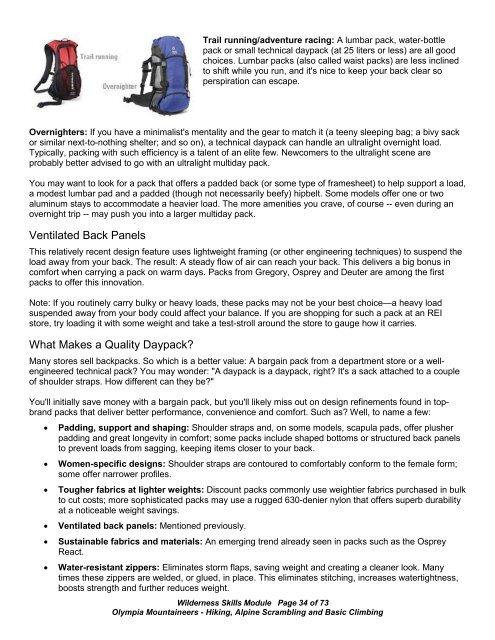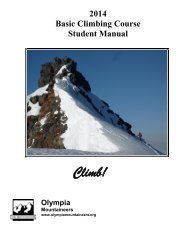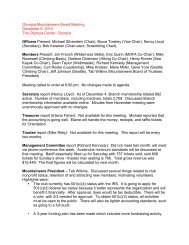Wilderness Skills - Olympia Mountaineers
Wilderness Skills - Olympia Mountaineers
Wilderness Skills - Olympia Mountaineers
Create successful ePaper yourself
Turn your PDF publications into a flip-book with our unique Google optimized e-Paper software.
Trail running/adventure racing: A lumbar pack, water-bottle<br />
pack or small technical daypack (at 25 liters or less) are all good<br />
choices. Lumbar packs (also called waist packs) are less inclined<br />
to shift while you run, and it's nice to keep your back clear so<br />
perspiration can escape.<br />
Overnighters: If you have a minimalist's mentality and the gear to match it (a teeny sleeping bag; a bivy sack<br />
or similar next-to-nothing shelter; and so on), a technical daypack can handle an ultralight overnight load.<br />
Typically, packing with such efficiency is a talent of an elite few. Newcomers to the ultralight scene are<br />
probably better advised to go with an ultralight multiday pack.<br />
You may want to look for a pack that offers a padded back (or some type of framesheet) to help support a load,<br />
a modest lumbar pad and a padded (though not necessarily beefy) hipbelt. Some models offer one or two<br />
aluminum stays to accommodate a heavier load. The more amenities you crave, of course -- even during an<br />
overnight trip -- may push you into a larger multiday pack.<br />
Ventilated Back Panels<br />
This relatively recent design feature uses lightweight framing (or other engineering techniques) to suspend the<br />
load away from your back. The result: A steady flow of air can reach your back. This delivers a big bonus in<br />
comfort when carrying a pack on warm days. Packs from Gregory, Osprey and Deuter are among the first<br />
packs to offer this innovation.<br />
Note: If you routinely carry bulky or heavy loads, these packs may not be your best choice—a heavy load<br />
suspended away from your body could affect your balance. If you are shopping for such a pack at an REI<br />
store, try loading it with some weight and take a test-stroll around the store to gauge how it carries.<br />
What Makes a Quality Daypack?<br />
Many stores sell backpacks. So which is a better value: A bargain pack from a department store or a wellengineered<br />
technical pack? You may wonder: "A daypack is a daypack, right? It's a sack attached to a couple<br />
of shoulder straps. How different can they be?"<br />
You'll initially save money with a bargain pack, but you'll likely miss out on design refinements found in topbrand<br />
packs that deliver better performance, convenience and comfort. Such as? Well, to name a few:<br />
• Padding, support and shaping: Shoulder straps and, on some models, scapula pads, offer plusher<br />
padding and great longevity in comfort; some packs include shaped bottoms or structured back panels<br />
to prevent loads from sagging, keeping items closer to your back.<br />
• Women-specific designs: Shoulder straps are contoured to comfortably conform to the female form;<br />
some offer narrower profiles.<br />
• Tougher fabrics at lighter weights: Discount packs commonly use weightier fabrics purchased in bulk<br />
to cut costs; more sophisticated packs may use a rugged 630-denier nylon that offers superb durability<br />
at a noticeable weight savings.<br />
• Ventilated back panels: Mentioned previously.<br />
• Sustainable fabrics and materials: An emerging trend already seen in packs such as the Osprey<br />
React.<br />
• Water-resistant zippers: Eliminates storm flaps, saving weight and creating a cleaner look. Many<br />
times these zippers are welded, or glued, in place. This eliminates stitching, increases watertightness,<br />
boosts strength and further reduces weight.<br />
<strong>Wilderness</strong> <strong>Skills</strong> Module Page 34 of 73<br />
<strong>Olympia</strong> <strong>Mountaineers</strong> - Hiking, Alpine Scrambling and Basic Climbing




